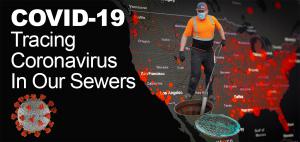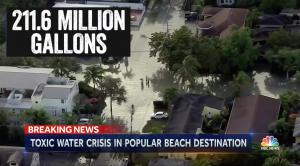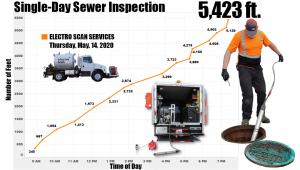Electro Scan Helps Cities Mitigate & Trace the Spread of COVID-19 by Locating Leaky Sewer Pipes for Targeted Repairs

The risk of transmitting COVID-19 from households to wastewater treatment plants is forcing utilities to expedite plans to plug leaks in their sewer system to prevent the spread of coronavirus to surface & groundwater supplies.

Much of the money spent to eliminate leaks in sewers has failed to achieve its goals as re-connection of customer sewer taps unexpectedly cut with larger holes, created larger leaks, 'approved' by visual inspection.
Officials Planning to Map the Health of their Communities Must Find & Fix Leaks in Sewer Pipes First, Before Accurate Contact Tracing of COVID-19 Can Happen
According to the World Health Organization (WHO), "a risk assessment should be conducted to confirm whether wastewater is contained and does not leak from the system before it reaches a functioning treatment and/or disposal site."
Today, dozens of cities worldwide are detecting trace amounts of COVID-19 at wastewater treatment plants (WWTPs), as more than 200,000 new cases are identified in the U.S. on most days, and every day this past week more than 1,000 Americans have died of the virus.
But, the survivability of coronavirus in wastewater collection systems is relatively short-lived, lasting only 2-3 days.
And, since still-active coronavirus flushed from toilets may require 2-7 days to travel from household- to-WWTP, COVID-19 affected raw wastewater may either seep into shallow groundwater or surface water bodies through leaky pipe joints and cracks — perhaps within minutes or hours after flushing — or become inactive before reaching a treatment facility.
The WHO has also identified hospitals, medical clinics, convalescent homes, and elderly care facilities, connected to downstream sewers that flow to WWTPs, as higher risk lines.
But, recent watertightness testing of old & new sanitary sewer pipes confirm that major leaks exist in great numbers, including recently installed Cured-In-Place Pipe (CIPP) 'approved' by Closed-Circuit Television (CCTV) cameras; an inspection method universally acknowledged as 'unable to certify pipes as watertight' but still used by most cities and contractors.
"Delays in fixing our crumbling sewer infrastructure prevents epidemiologists & other health care professionals from using our collection systems to conduct accurate tracing of COVID-19 in our communities," states Chuck Hansen, Chairman, Electro Scan Inc. and former Chair, ASTM Subcommittee F36.20 on Inspection and Renewal of Water and Wastewater Infrastructure.
Current and ongoing research suggests that strategically-placed sensors can identify COVID-19 in collection systems and may offer an 'early warning' system to identify pathways of community spread, especially using technologies from companies like BioBot Analytics.
But, evidence of successfully tracing COVID-19 through wastewater collection systems, from toilet-to-treatment plant, is still not available.
"Leaks in older sewers & newly rehabilitated pipes that were previously not adequately inspected, may allow virus-bearing human waste to continue to seep out of leak-ridden sewer systems, compromising accurate mapping of our community's health," continued Hansen.
A well-known environmental, social, and governance (ESG) entrepreneur, Hansen created the largest enterprise asset management software company founded in 1983 that was dedicated to managing sewer and water infrastructure; sold in 2007 to private equity firm, Golden Gate Capital, and Infor Global.
City councils that authorized billions of dollars spent over the last 40-years on trenchless repairs using CIPP, oftentimes don't eliminate leaky sewers either.
Often promising major reductions in infiltration & exfiltration (i.e. water entering and existing a pipe that shouldn't), the same amount of rainwater still percolates through soils during wet weather events. If a CIPP contractor cuts an unintended larger hole in its liner to restore or reopen a customer's connections to the sewer main, then overall pipe leakage may leak more, not less, after CIPP rehabilitation.
Often 'inspected' by the same company doing the rehabilitation using CCTV camera that are not able to certify pipes as watertight, cities may be funding sewer capital improvements with pipes that still have major leakage.
Domestic drinking water supplies have not been directly affected by COVID-19, as potable water is conveyed in pressurized pipes where containment and water quality is very reliable.
However, leaky sewers represent an ongoing and significant public health concern.
As documented by the U.S. EPA, sewer collection systems routinely carry bacteria, viruses, protozoa (parasitic organisms), helminths (intestinal worms), and borroughs (inhaled molds and fungi), that routinely flow out of sewer pipes through cracks and bad joints during storm events, resulting in sanitary sewer overflows.
Each year in the United States nearly 1 trillion gallons of raw sewage unintentionally flows from sewer systems into open areas, shallow groundwater, and rivers, lakes, and streams, degrading natural ecosystems, endangering public health, and violating the Clean Water Act's goal of fishable & swimmable waters.
"Nearly 3.5 million Americans get sick each year after swimming, boating, fishing, or otherwise touching water they thought was safe," according to American Rivers.
"Think of wastewater collection systems as slow-moving underground rivers of potential biohazards, which can carry harmful bacteria and viruses, such as COVID-19, underneath our neighborhoods," states Michael Condran, PE, Vice President, Electro Scan Inc.
"Unfortunately, technology to accurately document pipe leaks has lagged behind infrastructure construction projects, mostly benefiting contractors given lenient watertightness acceptance standards," stated Condran.
"But, new inspection methods now offer utilities fast, efficient, and cost-effective QA/QC practices to find leaks and certify pipe repairs with same-day results," stated Condran.
"It's amazing to be in the field with our [Electro Scan] crews and watch the water pressure drop during a scan as our probe moves through a pipe, documenting where water is seeping out of pipes due to bad joints & poorly connected customer connections — unable to hold water inside the pipe," stated Carissa Boudwin, Vice President, Marketing Electro Scan Inc.
"Comparing results from our Focused Electrode Leak Location (FELL) cloud app with manually recorded CCTV reports shows utilities where leaks went unrecorded, and therefore not prioritized as needed repairs or rehabilitation," continued Boudwin.
"Little did we know that past Electro Scan projects would help support contact tracing of viruses and help mitigate pandemic conditions," stated Boudwin.
In a recent project, an outbreak of E. coli at a lakeside community caused the illness of eighteen people, including hospitalization of eleven children, caused by leaking sewers that were found by Electro Scan.
In another project, high levels of fecal coliform resulted in the frequent closure at a popular beach linked to leaky sewers. Again, found and quantified by Electro Scan.
Now, more than ever, utilities can play an essential role in improving groundwater and surface water quality by finding & reliably repairing sewer leaks, before infiltration or exfiltration might occur. And, allow for advanced tracing of COVID-19 and other future transmissible diseases.
Today, Electro Scan is busy converting new & existing municipal CCTV trucks to find leaks using Hansen's patented machine-intelligent FELL equipment that surveys most pipes in ten minutes or less, and allows unbiased and unambiguous results to be available on the cloud in minutes.
Electro Scan is also expanding its dealer network and authorized service partners to better serve the growing demand from municipal water & sewer agencies as they seek to identify leak locations and prioritize repairs.
Able to install equipment in existing municipal CCTV trucks at a cost of about $200,000 per truck, or conduct surveys either using Electro Scan crews or certified third-party contractors, the company's proprietary technology can survey pipes at the daily rate of 1,000 ft (330m) to 7,000 ft (2,100m) at costs ranging from $3.00 to $7.50 per foot.
Working last week for Hillsborough County (Florida) Public Utilities Department, Electro Scan crews completed over 5,400 feet of pipe inspection (over a mile) in a single day, conforming to CDC safety guidelines for personal protective equipment and social distancing.
"If there is any 'silver lining' from the COVID-19 pandemic, it might be the ability for utilities to stop and reassess the technologies that haven't been working to identify and reduce infiltration, and adopt new solutions that deliver asset stewardship & resiliency," stated Mike App, Vice President, Electro Scan Inc.
ABOUT ELECTRO SCAN
Headquartered in Sacramento, Calif., the company designs, develops, and markets proprietary pipe condition assessment equipment, delivers field services, and offers cloud-based data processing and reporting applications that automatically locate, measure, and report defects typically not found using legacy inspection methods. In 2020, the company was named to Government Technology’s esteemed GovTech 100 list for the second year in row.
#astmf2550 #awwam77 #cctv #cipp #esg #faultycipp #fell #I&i #infiltration #leak #leakdetection #pacp #m77 #mscc #nassco #trenchless
Carissa Boudwin
Electro Scan Inc.
+1 916-779-0660
email us here
Visit us on social media:
Facebook
Twitter
LinkedIn
Legal Disclaimer:
EIN Presswire provides this news content "as is" without warranty of any kind. We do not accept any responsibility or liability for the accuracy, content, images, videos, licenses, completeness, legality, or reliability of the information contained in this article. If you have any complaints or copyright issues related to this article, kindly contact the author above.



